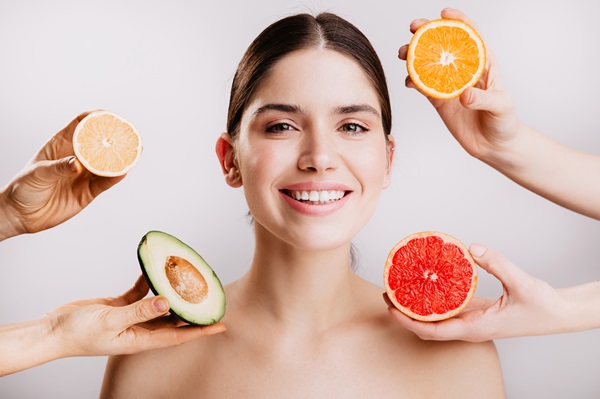I. Introduction
Your skin is not just a superficial covering; it’s a dynamic organ that reflects your overall health. The quest for radiant, glowing skin often leads people to try various skincare products, but what if the key to a luminous complexion is not in a jar, but on your plate? This article delves into the significance of nutrition for healthy skin and offers insights into how you can achieve that enviable, radiant complexion through dietary choices.

II. Understanding Skin Anatomy
Before we explore the nutritional aspect, let’s understand the complex architecture of your skin. It’s not just one layer but a multi-tiered system. The outermost layer, the epidermis, provides a protective barrier. Just beneath it lies the dermis, where collagen and elastin reside, keeping your skin firm and elastic. The subcutaneous tissue sits beneath, serving as insulation and a cushion.
III. Common Skin Issues
Skin issues like acne, fine lines, and dryness can impact not only your appearance but also your self-esteem. It’s essential to address these concerns effectively and understand that a proper diet plays a pivotal role.
IV. The Link Between Nutrition and Skin Health
What you eat has a direct impact on your skin’s health. Skin is nourished through the bloodstream, so the nutrients you consume are transported to the skin. Vitamins, minerals, and other compounds in your food directly affect skin structure and function.
V. Antioxidants and Their Impact
Antioxidants are your skin’s best friends. They neutralize free radicals, molecules that can damage skin cells and accelerate aging. Foods rich in antioxidants, like berries, dark chocolate, and artichokes, can help protect your skin.
VI. Vitamins for Vibrant Skin
Vitamins A, C, and E are particularly beneficial for your skin. Vitamin A aids in skin repair, vitamin C supports collagen production, and vitamin E offers protection against UV damage. Find these vitamins in foods like sweet potatoes, citrus fruits, and nuts.
VII. Hydration and Skin Suppleness
Water is the elixir of life for your skin. Staying well-hydrated ensures your skin maintains its elasticity and suppleness. Aim to drink at least 8 glasses of water a day for optimal hydration.
VIII. Omega-3 Fatty Acids and Inflammation
Omega-3 fatty acids, found in fatty fish like salmon and walnuts, are anti-inflammatory powerhouses. By reducing inflammation in the body, they help prevent skin conditions like acne and psoriasis.

IX. Collagen and Skin Elasticity
Collagen is the protein responsible for skin’s elasticity. Foods like bone broth, chicken, and fish provide the necessary building blocks for collagen production.
X. The Downside of Sugar and Processed Foods
Excessive sugar consumption and processed foods can lead to inflammation and skin issues. Sugar, in particular, can accelerate the breakdown of collagen, leading to premature aging.
XI. Foods to Include for Radiant Skin
To achieve a radiant complexion, incorporate skin-friendly foods like avocados (rich in healthy fats), spinach (packed with vitamins and antioxidants), and tomatoes (a source of lycopene, which protects against sun damage).
XII. The Importance of Balanced Nutrition for Healthy Skin
Balancing macronutrients (carbohydrates, proteins, and fats) in your diet is essential for overall health and nutrition for healthy skin. A well-rounded diet provides the full spectrum of nutrients your skin needs.
XIII. The Role of Water in Skin Radiance
Water intake directly influences skin radiance. It keeps your skin hydrated, flushes out toxins, and helps maintain a healthy, youthful glow.
XIV. Skin-Friendly Nutritional Habits
Developing habits like mindful eating, portion control, and meal planning can significantly impact the quality of your skin. Avoiding overeating and junk food is crucial.
XV. Nutrient Supplements
While most nutrients should come from your diet, supplements may be necessary in some cases. Consult a healthcare professional to determine if you have specific nutrient deficiencies.
XVI. The Impact of Lifestyle Choices
Adequate sleep, regular exercise, and stress management are vital to nutrition for healthy skin. Poor sleep and high-stress levels can lead to skin problems, so prioritize self-care.

XVII. Skin Care Products vs. Nutrition
Skincare products are valuable, but they can only do so much. Nutrition addresses skin issues at their root, ensuring a more holistic and long-lasting solution.
XVIII. Case Studies
Real-life examples of individuals who transformed their skin through nutrition are inspiring. Their stories highlight the power of dietary choices in achieving a radiant complexion.
XIX. The Science of Gut-Skin Connection
Recent research has uncovered the gut-skin connection. The health of your gut microbiome influences your skin health, emphasizing the importance of a balanced diet for both systems.
XX. Culinary Techniques for Skin-Friendly Meals
Preparing delicious, skin-boosting dishes can be a culinary adventure. Explore recipes and cooking methods that emphasize the use of nutritious ingredients.
XXI. Monitoring and Adapting Your Skin Nutrition Plan
Track your diet’s impact on your skin. If you notice issues, make necessary dietary adjustments. Remember, each person’s skin is unique, and customization is key.
XXII. Consultation with Professionals
If you have persistent skin issues, consider consulting dermatologists and nutritionists. They can provide personalized guidance to address your specific needs.
XXIII. Ethical and Sustainable Food Choices
Your dietary choices also impact the environment. Choose sustainable, ethical foods to support not only your skin but the planet as well.
XXIV. Aging Gracefully with Nutritional Wisdom
The choices you make throughout your life influence how you age. By consistently making wise nutritional choices, you can age gracefully with healthy, radiant skin.
XXV. Conclusion
In summary, the journey to radiant skin isn’t just about what you apply on the outside. It begins with what you feed your body, specifically focusing on nutrition for healthy skin By embracing a diet rich in antioxidants, vitamins, and skin-loving nutrients, staying hydrated, and making informed dietary choices, you can achieve and maintain that enviable, radiant complexion. Your skin will thank you for it.




